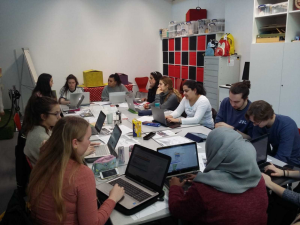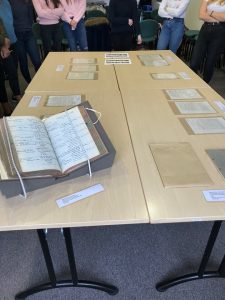
As Mauritian ecologist Vincent Florens asserts, Mauritius truly is a ‘laboratoire du monde’. With no original, in-dwelling inhabitants, Mauritius’s present-day population is made up entirely of the descendants of French colonial settlers, enslaved Africans and Malagasy, Indian indentured labourers, Chinese traders and other economic migrants from across the globe, with each successive human wave leaving its mark on the languages, cultures, customs and natural environment of this small, postcolonial ‘rainbow nation.’ On 12 March this year, Mauritius marked fifty years of independence from Great Britain, in a ceremony attended by heads of state, crowds of ordinary Mauritians – and me. Despite Mauritius’s inauspicious beginnings as an independent nation, post-colonial Mauritius has been widely praised for its ‘economic miracle’ and for the peaceful accommodation of its multi-ethnic population. Nonetheless, Mauritian literature – especially that written in the wake of the inter-ethnic ‘Kaya riots’ of 1999 – paints a rather different picture of the island-nation, marked by inequality, injustice, difference, division and violence. Given the diverse composition of Mauritius’ population (made up of Franco-Mauritians, Indo-Mauritians, Sino-Mauritians, Muslims and Creoles), Mauritian fiction is also centrally preoccupied with the question of what it means to be ‘Mauritian’ today: in other words, with the issue – or problem – of ‘belonging’.
What drew you to focus your research on Mauritian Literature and the notion of ‘belonging’?
My fascination with Mauritian literature was originally sparked, back in 2001, by a lively, wine-fuelled conversation with Mauritian academic, Kumari Issur, at an ASCALF conference in London. I had just presented a paper on Gallimard’s contentious ‘Continents Noirs’ series and Kumari recommended that I read Amal Sewtohul’s first novel, Histoire d’Ashok et d’autres personnages de moindre importance, which was about to appear in the same series, along with his compatriot, Ananda Devi’s Pagli. Numerous subsequent visits to Mauritius, meetings with Mauritian authors, impassioned debates with Indian Ocean academics, and continued voracious reading, often ‘hot off the press’, of the impressive stream of novels that have continued to flow from the tiny island-nation since, have merely confirmed my initial fascination with Mauritius’ culture, history, society and literature.
My interest in the notion of ‘belonging’ – a sense of attachment to, and identification with, a place or people – was prompted both by the thematic and stylistic recurrence of the notion in contemporary Mauritian literature and, more broadly, by the term’s paradoxical ubiquity and obscurity. Everyone thinks they know what they mean when they talk about belonging, but, as geographer Marco Antonsich points out, they ‘actually know very little about what belonging stands for and how it is claimed.’[1] I was keen to find out more. Whereas existing postcolonial paradigms, such as hybridity or créolisation, had already been fruitfully applied to the Mauritian situation, no one had yet taken belonging, or the ‘universal human desire to belong’, as the primary thematic and conceptual focus of study. As John Crowley points out, ‘while the term [belonging] itself is not new, it is little used as an analytical or theoretical tool.’[2] I was keen to rise to this challenge.
What makes your book stand out from others in its field?
My monograph is the first book-length study in English on twenty-first-century Mauritian fiction in French and as such, I hope, makes a significant contribution to the recent expansion of research on Indian Ocean cultures. The book is original in its focus on the under-researched, affective dimension of belonging (place-belongingness) and its intersections with the often brutal and exclusionary ‘politics of belonging.’ My chapter on Shenaz Patel’s Le Silence des Chagos, in which I explore the uses and abuses of competing notions of belonging in the UK’s forced expulsion of the Chagos islanders in the 1960s and 70s, should also be of interest to anyone following the latest developments in their long struggle for the right to return at the International Court of Justice this year.
My book develops a new, multidimensional approach to understanding issues of belonging and exclusion in diverse, multi-ethnic societies that will, I hope, be of interest to a broad academic audience than those already interested in Mauritian literature or Indian Ocean cultures. Through a series of close textual analyses of individual novels or pairs of novels by leading contemporary Mauritian writers, my book examines Mauritian literary responses to the inter-ethnic ‘Kaya’ riots of 1999 and to the problems of belonging and exclusion that they so dramatically exposed. And it does so by applying an eclectic range of theoretical approaches, not usually associated with ‘postcolonial’ texts, to the particular concerns of individual novels and chapters: violence, place, gender, displacement, the everyday, migration.
Your book is available Open Access, can you tell us why you chose to pursue this option?
In this, the 50th anniversary year of Mauritian independence (1968), there is intense international interest in post-independence Mauritian culture. There is also renewed interest this year in the plight of exiled Chagos islanders, as the Mauritian government challenges the U.K. for its illegal separation of the Chagos archipelago from Mauritius, prior to independence. My book is therefore timely and should, I hope, garner considerable international attention, including amongst readers in Mauritius, India, Africa and the Indian Ocean region. Open Access publication is thus ideal for making my book both logistically and financially accessible to these and other key readerships, both overseas and in the UK. I am therefore grateful to the University of Reading for their institutional support of the OA publication of my monograph – and to Liverpool University Press, Modern Languages Open and Oapen Library for making it happen.
[1] Marco Antonsich, ‘Searching for Belonging – An Analytical Framework’, Geography Compass, vol. 4, no. 6 (2010), pp. 644 ̶ 59; p. 644.
[2] John Crowley, ‘The Politics of Belonging: Some Theoretical Considerations’, in Andrew Geddes and Adrian Favell (eds.), The Politics of Belonging: Migrants and Minorities in Contemporary Europe (Aldershot: Ashgate, 1999), pp. 15 ̶ 39; p. 18.
Reviews
‘In this insightful book, Julia Waters provides new perspectives to chart the Mauritian 21st century novel – these stimulating and provocative essays illustrate the challenge provided by both the varied subject matter and the critical lenses adopted.’
Kumari R Issur, University of Mauritius
About The Author
Julia Waters is Professor of Contemporary Literature in French at the University of Reading.













